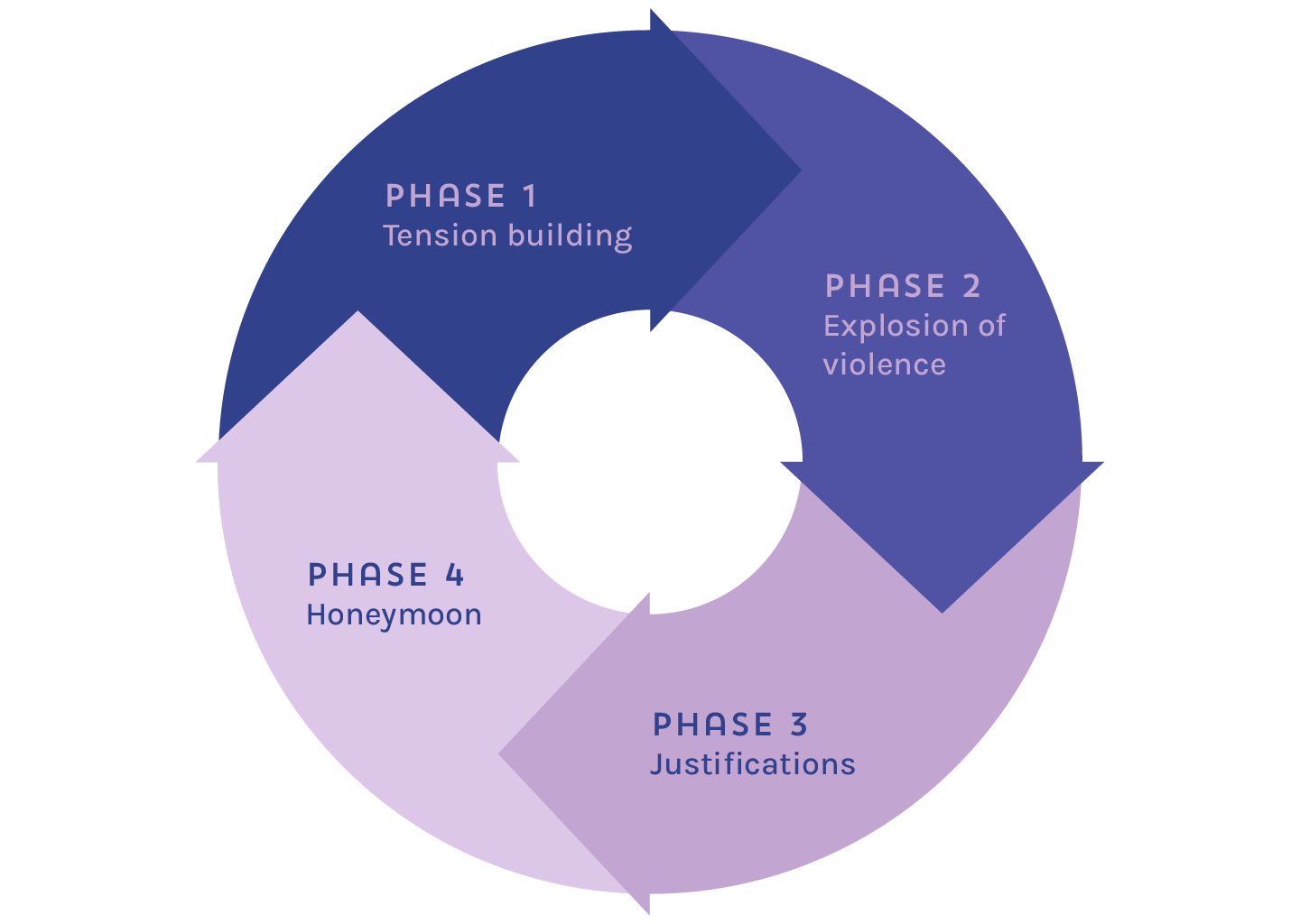DOMESTIC VIOLENCE: DEFINITION
Domestic violence is a power struggle within a love relationship, in which the aggressor has established domination by creating a climate of control, physical and/or psychological, of fear and discomfort against his victim. The victim lives in fear and uncertainty.
It can be difficult for the victim to realize that she is being abused because several factors can be used as excuses: a personality trait, fatigue, education, a troubled past; in short, anything that is not the abuser’s responsibility. But domestic violence is not a loss of control, it is intentional, calculated and repeated.
Domestic violence is not like a couple’s fight, in which both people try to express their point of views in a balanced and respectful way, before, during and after the conflict. Each person feels free to give their opinion and to argue.
In contrast, domestic violence is reflected in an imbalance in which one person tries to gain control and power over the other by any means necessary. Because of the fear of repercussions, the victim is deprived of her free will and unable to express her opinions or needs.
WHAT IS DOMESTIC VIOLENCE?
Domestic violence can take many forms, often intertwined.
Here are a few examples:
- Verbal: insults, threats, yelling, silence.
- Psychological: contemptuous behavior, emotional blackmail, denigration of the victim’s opinions, values, actions, friends, family, job.
The abuser may deliberately ignore the victim’s wants and needs and those of her children, and use the areas he knows are sensitive to manipulate her. He may behave in a jealous, controlling manner, blaming his victim for events and situations over which she has no control, and disclaiming responsibility for any abusive behavior.
- Physical: pushing, hitting, throwing objects in an attempt to frighten or injure, mistreating animals, interfering with the victim’s sleep or feeding, depriving her of medication and/or medical care.
- Economic: economic control, appropriation of the victim’s money and property, inability for the victim to engage in employment, and coercion into debt.
- Sexual: unwanted sexual acts committed against the victim, criticism of the victim’s body, deprivation of affection and sexual relations.
- Cyber-violence: incessant harassment by any means of communication, surveillance of the victim’s actions by geolocation, publication of private photos or videos on social networks, all forms of denigration, threats and intimidation on social networks.
The forms of domestic violence mentioned here are among the most frequent. However, there are many others, sometimes very subtle and insidious, which can place the victim in a position of doubt, shame and helplessness.
Do not remain isolated.
Break the silence, talk about what you are experiencing to someone you trust, contact us.
No excuse can justify violence.

CONSEQUENCES OF VIOLENCE FOR WOMEN
En plus des conséquences sociales, la violence conjugale peut avoir des effets dévastateurs sur la santé psychologique et physique des femmes qui en sont victimes:
In addition to the social consequences, domestic violence can have devastating effects on the psychological and physical health of women who experience it:
- Loss of self-esteem
- Isolation
- Decreased social network
- Absenteeism, decreased performance
- Financial difficulties
- Sleep and or appetite disorder
- Excessive consumption (alcohol, medication, drugs, etc.)
- Feelings of shame, guilt, helplessness
- Anxiety
- Depression, suicidal thoughts
- Ambivalence, doubts
- Physical injuries…
CONSEQUENCES OF VIOLENCE FOR CHILDREN
The children who live in this unhealthy and dangerous family climate, are also victims of domestic violence, which can lead to consequences such as:
- Tendency to isolation
- Difficulties in resolving conflicts
- Difficulties in forming friendships
- Learning disabilities
- Difficulty concentrating
- Sudden drop or increase in school performance
- Premature birth or low birth weight (in babies)
- Sleep and or appetite disorders
- Child wets his or her bed
- Child takes on the role of parent…
The arrival of a child, by disturbing the couple’s balance, can create jealousy and resentment in the spouse. This can lead to insults and denigration of the mother’s image, her function, her skills and her authority. Prevented from playing her role and caring for her child, domestic violence profoundly affects the mother’s conduct and consequently the mother-child bond.
Even if the violent events do not occur directly in front of the children, they perceive and feel the emotions that this causes. Despite all the means to spare them, children and adolescents who grow up in a climate of terror, insecurity and unspoken words remain marked for life. For some, this can translate into a feeling of being responsible for the protection of their mother, of having to assume the role of the second parent or of having to choose between their two parents.
At La Maison des femmes de Québec, youth professionals are available at all times to discuss the impact of domestic violence on the child. They can also provide mothers with tools to promote the child’s proper development and the building of a quality mother-child relationship for the future.
POST-SEPARATION DOMESTIC VIOLENCE
Domestic violence does not systematically end when a couple separates. When the ex-spouse is still active in trying to maintain control over the woman, it is called post-separation domestic violence. Here are some examples:
The ex-spouse
- continues to spy on and track his ex-spouse
- continues to harass his ex-spouse by any means of communication
- frequently shows up unannounced at her home or workplace
- drags her into legal proceedings in an abusive manner
- threatens to kidnap the children or takes action
- fails to comply with court orders (child custody periods, communication arrangements, etc.)
- threatens his ex-spouse and/or people in her circle and takes action
- destroys his ex-spouse’s property…
It is important to recognize post-separation domestic violence, which is as devastating to the women and children who are victims as domestic violence experienced during a relationship. When faced with such abuse, we encourage women to talk to someone they trust and not to be alone.